
| NORFOLK | NORWICH | GT. YARMOUTH | KINGS LYNN | NAME SEARCH | PUBLICATIONS | LINKS | MYSTERY | HOME |
| NORFOLK PUBLIC HOUSES |
 |
|||||||||
|
||||||||||
|
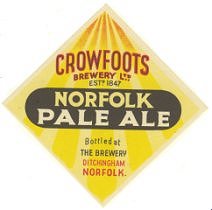 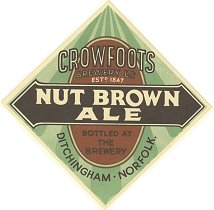 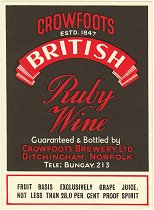 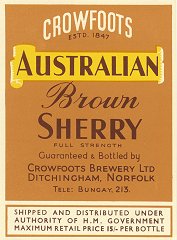 |
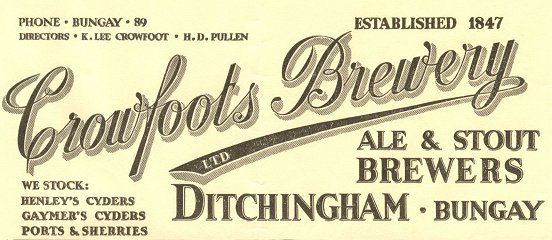 Billhead - pre 1948. The Ditchingham Brewery was built in 1847, but brewing is believed to have been previously carried out in buildings behind the Artichoke at Broome. The beer had a very good reputation and was produced using natural spring water from a well on the site. Became Crowfoots Brewery Limited in 1935 About 1950, 51 per cent of the brewery was taken over by the MacNichol brothers, whose interest was in whisky. Their aim was to expand and improve the business. It was at this time that wines and spirits were added to the portfolio of products. Unfortunately `several' consignments of wine had to be destroyed and financial problems ensued. The effects of the brewery were sold at auction 9th January 1951. The original desk from which 3 generations of Crowfoots had planned deliveries to villages within a twenty mile radius, was sold for £4. Other notable items were the four lead lined fermenting tanks, each with a capacity of 10 barrels, dating from 1847. December 1936 - OLD ALE, 8 shillings for a Dozen Pints, Delivered. Bankruptcy was declared in 1953 The brewery was sold and demolished. A house now sits on the site of the brewery and presumably the spring water is lost forever. Directors 1948 :- K. Lee Crowfoot Harold D. Pullen Directors post 1950 K. Lee Crowfoot Donald MacNicol Andrew MacNicol W. Howard Costello E. S. Costello |
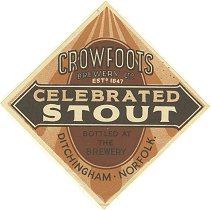 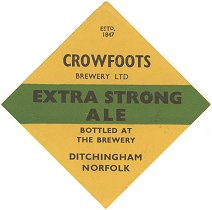 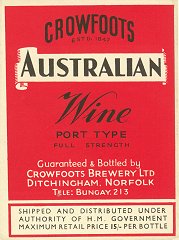 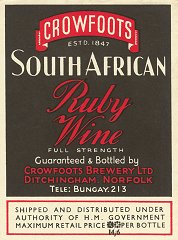 |
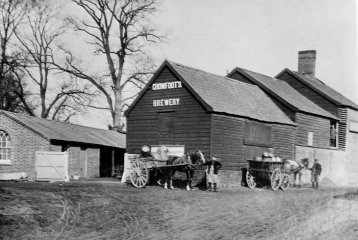 The brewery c1920 |
norfolkpubs.co.uk is indebted to Pamela Pullen for information provided. Pamela married Neil Pullen, the son of Harold and May Pullen. Neil Pullen worked at the brewery in his youth and some of his memories are recorded below. Commissioned into the Royal Norfolk Regiment in 1949, training at Sandhurst and serving in the Korean War and later in Hong Kong. Major Pullen became Army fixed wing examiner at the School Of Flying and other posts included training officer for the Guyana Defence Force in South America, helping to form the Army's first helicopter squadron. He retired from the army in 1972. Major Neil Pullen died in 2000 |
|
Memories
of Neil Pullen
Working at Crowfoots Brewery Brewing beer by the Crowfoot family started in the early 1800's or even
before, in local inns, one probable being the Artichoke Inn at Broome,
Norfolk.
The brewery was mainly of wooden construction, started in
1847, the original cellars and exterior structure remained throughout and
until its final sale in January 1951. So also were the original fermenting
vats and other equipment retained, any modernisation incorporated
filtering units and pasteurisation plants. The well from which all water
used was pumped. formerly by hand, then by one of the first steam engines.
This remained in use with its leather strap drives powering other
machinery.
The water from the well was effervescent as though carbonated, visitors would ask if they could go to the header tank to drink some. A jug and glasses were kept here for that purpose. The cellars, 3/4 underground, had a curved roof which tapered to the vertical - retained most of the original spiders, the cobwebs were never removed, by tradition. They insulated the cellars wherein the temperature did not vary by more than 1 degree throughout the year. The writer recalls throwing an old 1d into one dusty old cobweb which held the penny quite easily. One visitor maintained that two cobwebs behind a door acted as a closing spring. Another section of the brewery were the Maltings. Malt was made at the brewery from locally grown barley, the kiln clad with tiles with minute holes, heating under kiln by hot air from the furnace. The barley was turned by the maltster who judged the timing and temperature and also fed the furnace. The writer has assisted in both these tasks and can verify that it is only possible to spend 15 minutes stripped to the waist in the kiln without a break. During the 15 minutes the barley was turned by wooden `flats' or spatula's. Outside some beer would be taken to replace the lost sweat. The furnace would be fueled and back in to the kiln again. Beer was allowed to be consumed by any employee at any time. It would seem to make sense to put down knowledge of the brewery , associations and incidents as I, the writer, find myself the only person who remains alive that knows of it from the family side. A necessary digression here to clarify the Pullen / Crowfoot link. My aunt - `Flossie' married Lee Crowfoot, Flossie met Lee through my mother, Lucy May. When Flossie was dying she asked my mother to look after `Old Funny' which she called Lee, at this stage the two couples were living in Heath House. After Flossie died Lee's father went on a world cruise and by chance met Eliza Brown, to whom he proposed, was accepted and married. Eliza Brown was my father's aunt. This created the second link between the families. Lee never re-married, the writer was therefore brought up by virtually two fathers, Harold and Lee, and introduced by both into all facets of brewing and business. Relationships between employer and staff at the brewery were simple to the extreme. Any employee could have a word at any time. There was a waiting list who wanted to work at the brewery. Profits, if any, were split 50/50, half going back into the brewery and half split between the staff as a bonus on December 1st each year. There was always a payment on December 1st anyway, but a good profit swelled this as everybody knew. There was no question of overtime, just getting the job done; if a day off was required `have a word' and there was generally more opposition from other employees, albeit they were all friendly with each other. Employees were allowed to take beer home, no limit was ever laid down and the facility was never abused. Monitoring was by other employees who would `chip in' with beer by not taking any themselves if there was something like an engagement or 21st birthday to celebrate. Joe Burcham was the longest serving employee the brewery ever had. He started working washing bottles, the old sort, screw top and rubber rings - these latter changed every wash - there were cases of them - taken off by one tool and put on by a `stretcher'. Put the stopper into the `stretcher' and it popped a new ring on. From time to time, during the depression and during World War II, rings were not easily obtainable and only the really bad ones were replaced. Bottles were hand washed by shoving them individually on to a rotating brush (Driven by a strap from the steam engine) which was immersed in water, which slowly circulated from an `in' feed to a regulated outlet, then onto a sort of wooden paddle wheel which took about 4 dozen bottles on each paddle, was turned by hand, bottles filled with water, then as the paddle wheel was turned, came out the other side and drained, so this was a two way operation - brush, fill paddles, after 3 or 4, round to the other side and take out the clean bottles - back again to dirty bottles......et seq. Joe Burcham started work when he was 12 years old, for Lee Crowfoot's grandfather William, this would be about 1878. He had a grudging respect for the writer in that I washed barrels (Firkins - only 9 gallons) at 9 years old, after school sometimes, on holidays and at weekends. In 1946 when Joe was about 82, Lee asked me to go with Harold and tell him it was about time he left! The conversation went something like this: Joe (Walrus, tobacco stained moustache - pink hands - in water for some 68 years during working hours !), who did not stop working as he was talking :- `Ah master Lee I've been expecting you to come in and see'in you've got master Harold and young master Neil with you.........you're goin' to tell me I cant do my job anymore' Lee who did not mince words when the occasion was right: `No you silly old b***** its time you let another chap have a chance of a job.....the cottage you live in is yours (It belonged to the brewery) ..... and you will have the same wages without having to work.' Joe : `I'd reckoned on the cottage but I dont want any blazing wages, my boys are all right, I've a bit put away, only thing bother me is who you're got washin. ' Harold : ` Bills son and he's a hard worker, young Arthur.' Joe : ` I'll see' Lee : `Why' Joe : `He'll have to work with me for a couple of weeks.'
Lee : `OK, be in on Monday'
Joe gave Arthur stick for two weeks, then came in and
stood behind him for at least another week, blowing through his walrus moustache
every time Arthur made a mistake. Arthur got a bit upset and we told him
to ride with it, which he did. Joe came back from time to time and said it
did not seem right for him to sit and stare at his wife Sarah, all
day. Couldn't he do some sweeping or something ? ... and he didn't want
any money. The consensus was no and spend your time in the garden. In 1938 I recall Jim who drove one of the lorries, came
into the office (I was all of 10 years old) but I recall this so clearly
- and said that his daughter had to have an operation which was going to
cost £25. Lee opened the till, it was a good year, and gave Jim
£25....no signature......no agreement for repayment......Jim said `Thank
you master Lee' ...... knowing that it would be recovered gently at maybe
five bob a week, and that not until he could afford it. And there the memories of Major Neil Pullen abruptly end. Thank you Pamela. © Pamela Pullen 2006
Shawn
Peart advises November 2006 :- |